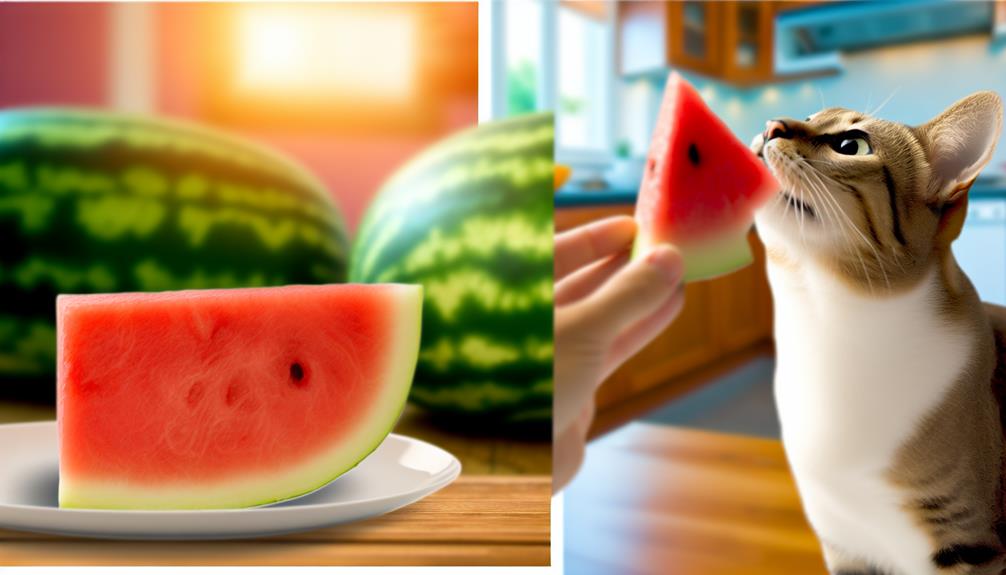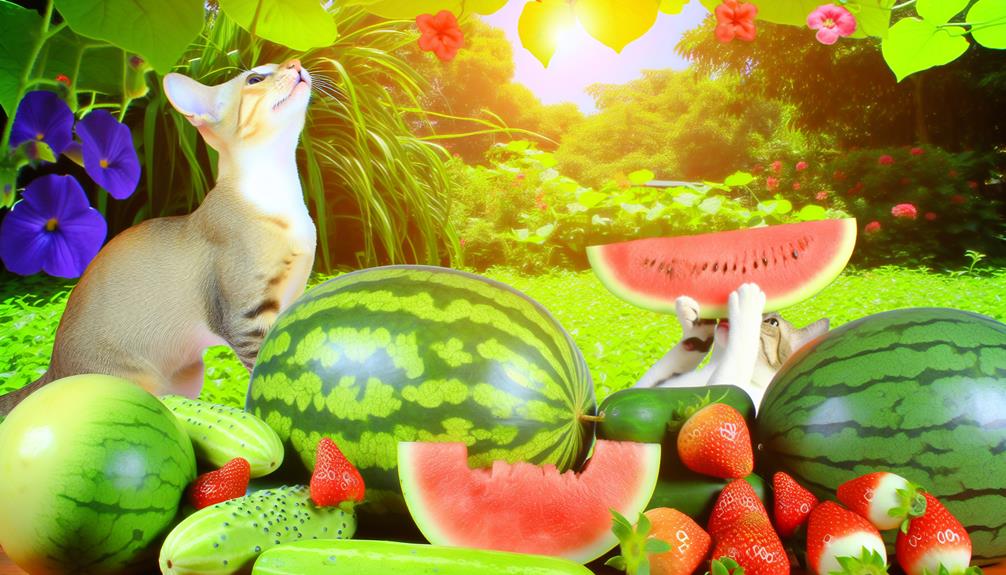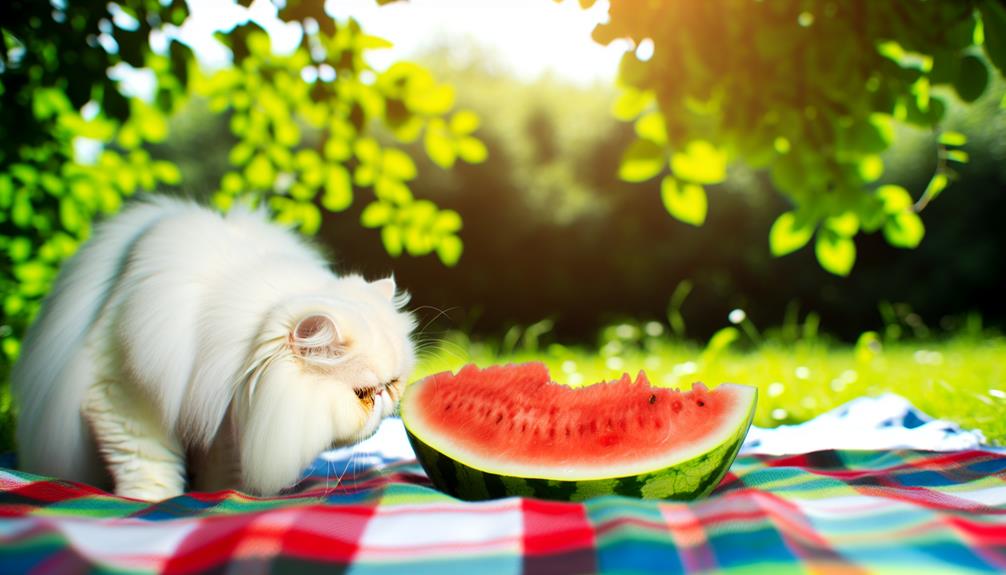You might be wondering whether it's safe to share that juicy slice of watermelon with your feline friend. While cats can indeed enjoy watermelon in moderation, there are several factors to take into account before offering it as a treat. From its hydrating benefits to potential risks, such as choking on seeds or dealing with digestive issues, understanding the full picture is essential. Additionally, the natural sugars in watermelon mean it should only be given occasionally. Curious about how to safely prepare watermelon for your cat and what signs to watch for? Let's explore further.
Nutritional Profile of Watermelon
Watermelon, a popular summer fruit, boasts a rich nutritional profile that can be quite beneficial for humans. When considering its various aspects, you'll find that watermelon is composed of approximately 90% water, making it an excellent option for hydration during hot weather. It's packed with essential vitamins and minerals, such as vitamins A and C, which are vital for your immune system and skin health. Additionally, watermelon contains antioxidants like lycopene, which can help combat oxidative stress and may reduce the risk of certain chronic diseases.
You'll come across several watermelon varieties, each with its unique taste and texture. Common types include the Crimson Sweet, known for its deep red flesh and high sugar content, and the Sugar Baby, a smaller, round variety with a concentrated flavor. There's also the seedless watermelon, which has become increasingly popular for its convenience. These varieties are typically available during the summer months, aligning with the fruit's seasonal availability. Watermelons are primarily harvested from May to September, although you might find them in stores outside this window, thanks to global import options.
From a nutritional standpoint, watermelon is low in calories, with about 30 calories per 100 grams, making it a guilt-free indulgence. It's also a good source of dietary fiber, which aids in digestion. Potassium found in watermelon can help regulate blood pressure, while the amino acid citrulline can improve blood flow and reduce muscle soreness. As a result, incorporating this fruit into your diet can provide multiple health benefits, especially during its peak season.
Health Benefits for Cats
When considering watermelon for your cat, it's essential to recognize its potential health benefits. This fruit can help with hydration and provide essential nutrients, while also serving as a low-calorie snack option. Additionally, watermelon may support your cat's digestive health due to its high water and fiber content.
Hydration and Nutrients Boost
Cats can indeed benefit from the hydration and nutrients found in watermelon. Given that watermelon is composed of about 92% water, it serves as an excellent source for cat hydration. Adequate hydration is essential for maintaining your cat's kidney function, temperature regulation, and overall well-being. Especially during the hotter months, or if your cat tends to drink less water, offering small pieces of watermelon can help keep them hydrated.
In addition to its hydrating properties, watermelon contains several nutrients that can aid in nutrient absorption and overall health. Vitamins A and C are abundant in watermelon, both of which are necessary for your cat's immune system and skin health. Vitamin A supports vision and reproductive health, while Vitamin C acts as an antioxidant, combating harmful free radicals in your cat's body. Moreover, watermelon offers a small amount of potassium, which is critical for muscle function and nerve signaling.
However, it is essential to recognize that watermelon should only be offered in moderation and as an occasional treat. Always remove the seeds and rind to prevent choking hazards or digestive issues. By doing so, you can safely provide a hydrating and nutritious snack for your feline friend.
Low-Calorie Snack Option
Including watermelon in your cat's diet as a low-calorie snack can offer multiple health benefits without adding excessive calories. Watermelon is low in calories and can be a healthier alternative to higher-calorie treats. Different watermelon varieties can provide slight variations in taste, allowing you to find one that suits your cat's preferences.
Here are some benefits of offering watermelon as a low-calorie snack:
- Weight Management: Helps maintain a healthy weight due to its low-calorie content.
- Hydration: High water content aids in keeping your cat hydrated.
- Vitamins & Minerals: Packed with essential nutrients like vitamins A, B6, and C.
- Antioxidants: Contains antioxidants that support overall health.
- Texture Variety: Offers a different texture, adding variety to your cat's diet.
It's important to monitor your cat's reaction to watermelon and confirm they enjoy it. Some cats may prefer a specific variety, so experimenting with different watermelon varieties can help you identify what they like best. Always serve watermelon in small, manageable pieces and avoid seeds and rind, as these can pose health risks.
Digestive Health Support
Alongside its benefits as a low-calorie snack, watermelon also promotes digestive health in cats. The fiber content in watermelon can be particularly advantageous for your feline friend. Fiber plays an essential role in maintaining a healthy digestive system by adding bulk to the stool, which can help prevent constipation. In addition, it aids the smooth passage of food through the gastrointestinal tract, supporting overall gut health.
Watermelon's high water content further complements its fiber, ensuring that your cat stays hydrated. Proper hydration is essential for ideal digestive function, reducing the risk of issues like urinary tract infections and kidney stones, which are common in cats.
The gastrointestinal benefits of watermelon extend beyond just hydration and fiber. The fruit contains antioxidants like lycopene and vitamins A and C, which can help reduce inflammation in the gut. This is particularly beneficial for cats with sensitive digestive systems or those prone to gastrointestinal disorders.
However, while watermelon offers these benefits, it should be given in moderation. Too much fiber can lead to digestive upset. Always remove seeds and rind before offering watermelon to your cat, as these parts can be harmful.
Potential Risks to Cats

When considering watermelon for your cat, it's important to be aware of potential risks. The fruit's seeds and rind can pose choking hazards, while its high sugar content may lead to digestive issues. Additionally, your cat's digestive system isn't designed to handle large amounts of fruit, which could result in gastrointestinal upset.
Choking Hazard Concerns
Despite watermelon being a hydrating and revitalizing treat, it's important to be aware of the potential risks it poses to your feline friend, particularly concerning choking hazards. While cats can enjoy the occasional piece of watermelon, you must exercise caution to guarantee safe feeding practices. Cats have relatively small throats, and improperly prepared watermelon chunks can become lodged, creating a serious choking risk.
To enhance choking prevention and guarantee your cat's safety, consider the following guidelines:
- Remove Seeds: Always remove all seeds, as they can be a significant choking hazard.
- Cut into Small Pieces: Make sure the watermelon is cut into very small, manageable pieces that your cat can easily chew and swallow.
- Monitor Eating: Supervise your cat while it's eating to quickly intervene if any issues arise.
- Avoid the Rind: The rind is tougher and harder to digest, posing a choking risk and potential digestive issues.
- Start Slowly: Introduce watermelon gradually to observe any adverse reactions or difficulty in eating.
Sugar Content Issues
While watermelon can be a invigorating treat, it's important to contemplate its sugar content and the potential risks it poses to your cat's health. Cats have a unique feline metabolism that processes sugars differently from humans. Unlike us, cats lack taste receptors for sweetness, meaning they don't derive the same pleasure from sugary foods. However, the natural sugars in watermelon can still impact their health.
High sugar intake can lead to obesity and diabetes in cats. Even though watermelon contains natural sugars, these can accumulate over time, leading to weight gain and metabolic issues. Given that cats don't need carbohydrates in their diet, introducing sugar-laden treats like watermelon can disrupt their nutritional balance.
If you're considering a rejuvenating treat for your cat, exploring sugar alternatives that are safe and beneficial for their health is advisable. For instance, small portions of cooked vegetables or specially formulated cat treats can be healthier options. Always consult your veterinarian before introducing any new food into your cat's diet to ascertain it aligns with their specific health needs. Remember, moderation is key, and understanding the implications of sugar on feline metabolism can help you make informed dietary choices for your pet.
Digestive System Impact
Cats have a highly sensitive digestive system, and introducing new foods like watermelon can have several implications. While watermelon is generally safe for cats in small amounts, there are potential risks you should be aware of.
First, the fiber content in watermelon can affect your cat's gut health. Cats are obligate carnivores, meaning their digestive systems aren't designed to process large amounts of plant material. Excessive fiber can lead to gastrointestinal upset, including diarrhea and constipation.
Here are some potential risks to take into account:
- Diarrhea: The high water and fiber content can cause loose stools.
- Constipation: In some cats, fiber might paradoxically lead to constipation.
- Gastrointestinal upset: Introducing new foods can disrupt your cat's gut health, causing vomiting or discomfort.
- Allergic reactions: Although rare, cats can develop allergies to new foods, including fruits like watermelon.
- Choking hazards: Seeds and rinds can pose choking risks and should be removed before offering watermelon to your cat.
Portion Size and Frequency
When it comes to determining the portion size and frequency for feeding watermelon to your cat, moderation is vital. Cats are obligate carnivores, meaning their primary nutritional needs are met through meat. While watermelon can be a hydrating and occasional treat, portion control is important to avoid digestive issues and guarantee your cat's diet remains balanced.
For serving suggestions, aim for small, bite-sized pieces that are easy for your cat to chew and digest. A general guideline is to offer no more than a teaspoon-sized portion of watermelon per serving. This amount is sufficient to provide a rejuvenating treat without overwhelming their digestive system. Remember, watermelon should only constitute a very small part of their overall diet.
Frequency is another significant factor. Offering watermelon as a treat once or twice a week is more than enough. Overfeeding can lead to gastrointestinal upset or even interfere with your cat's usual dietary intake. This moderation guarantees that your cat enjoys the benefits of watermelon—such as hydration—without any adverse effects.
It's also important to monitor your cat's reaction to watermelon. Some cats may have sensitivities or allergies that you might not be aware of. If you notice any signs of discomfort, such as vomiting or diarrhea, it's best to discontinue the treat and consult your veterinarian.
Preparing Watermelon for Cats

To prepare watermelon for your cat, start by thoroughly washing the fruit to remove any pesticides or contaminants. This is a vital step in guaranteeing that your cat doesn't ingest harmful chemicals that could be present on the watermelon's rind. After washing, follow these steps for proper watermelon preparation and cat serving:
- Remove the rind: The rind is tough and difficult for cats to digest. Carefully cut away the outer green skin and the white part just beneath it.
- Remove the seeds: Watermelon seeds can be a choking hazard and may cause intestinal blockages. Make sure to remove all seeds before serving.
- Cut into small pieces: Dice the watermelon into small, manageable pieces that are easy for your cat to consume. Aim for bite-sized portions to prevent choking.
- Check for freshness: Verify the watermelon is fresh and free from any signs of spoilage. Fresh fruit is not only more appealing but also safer for your cat.
- Serve in moderation: While watermelon can be a hydrating treat, it should be given sparingly. Too much watermelon can upset your cat's stomach.
When preparing watermelon for your cat, it's important to take into account both the safety and nutritional aspects. Proper watermelon preparation involves meticulous cleaning, deseeding, and cutting into appropriate serving sizes. This guarantees that the treat is both enjoyable and safe for your feline companion. Always observe your cat during their first few servings to confirm they tolerate the fruit well. If your cat enjoys watermelon and shows no adverse reactions, it can be an occasional, invigorating treat.
Signs of Allergic Reactions
It's important to recognize the signs of allergic reactions in your cat when introducing new foods like watermelon. Cats, much like humans, can have sensitivities and may exhibit allergy symptoms that indicate an adverse reaction. Monitoring your feline friend closely during and after their first taste of watermelon is significant.
Common allergy symptoms in cats include itching, redness, and swelling, particularly around the mouth, face, and ears. You might notice your cat scratching more frequently or grooming excessively in these areas. Gastrointestinal signs, such as vomiting or diarrhea, can also occur if your cat is sensitive to watermelon. Lethargy and loss of appetite are additional indicators that something isn't right.
Respiratory symptoms, though less common, can manifest as sneezing, coughing, or difficulty breathing. If you observe any of these signs, it's important to cease feeding watermelon immediately and consult your veterinarian. Early detection and intervention are key to managing cat sensitivities effectively.
In rare cases, a severe allergic reaction known as anaphylaxis could occur. This condition is life-threatening and requires immediate veterinary attention. Symptoms of anaphylaxis include sudden difficulty in breathing, collapse, or a rapid drop in blood pressure. Recognizing these severe signs and seeking prompt medical help can save your cat's life.
To minimize risks, introduce watermelon in small amounts and observe your cat closely for any adverse reactions. Knowing the allergy symptoms and being attentive to your cat's behavior guarantees you can enjoy new treats safely and responsibly. Always prioritize your cat's health and well-being when introducing any new food items.
Alternative Hydrating Treats

Your cat's hydration is essential, especially during hot weather or if they aren't drinking enough water. When your feline friend needs an extra boost of hydration, offering alternative hydrating treats can be a wise strategy. Not only do these treats help maintain fluid balance, but they can also be a delightful change of pace for your pet.
One excellent option is cucumber slices. Cucumbers are composed of about 95% water, making them an ideal hydrating snack. Simply wash and peel the cucumber, then slice it into small, manageable pieces. Avoid adding any seasonings or dressings, as these can be harmful to cats.
Another useful hydrating treat is coconut water. It's packed with electrolytes and can be particularly beneficial if your cat is dehydrated. Ascertain that the coconut water is pure and free from added sugars or artificial flavors. Introduce it gradually to see how your cat responds.
Here are five alternative hydrating treats you can offer:
- Cucumber slices: High water content and easy to prepare.
- Coconut water: Electrolytes-rich and hydrating.
- Ice cubes: Plain or flavored with a bit of tuna juice for added interest.
- Bone broth: Make sure it's low in sodium and free from onions and garlic.
- Watermelon: In moderation, as previously discussed, it's a hydrating fruit option.
When introducing new treats, monitor your cat for any adverse reactions. Always consult your veterinarian if you're unsure about a particular treat's safety. Remember, these hydrating treats should complement, not replace, your cat's regular diet and water intake.
Conclusion
To sum up, while watermelon can be a revitalizing and hydrating treat for your feline friend, moderation is key. By carefully removing seeds and rind, you can avoid any potential hiccups in your cat's digestion. Remember, due to its natural sugars, watermelon should be an occasional delight rather than a regular indulgence. Keep an eye on your cat's reaction, and consult your vet if you notice any unusual behavior. Offering alternative hydrating treats can also benefit their overall well-being.
